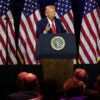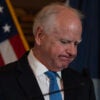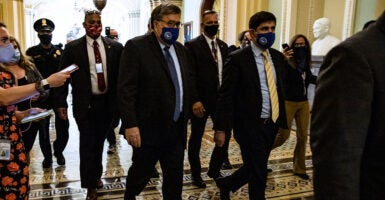Supreme Court Justice Samuel Alito ordered county election boards in Pennsylvania to comply with guidance requiring them to keep ballots received after 8 p.m. Election Day “in a safe, secure, and sealed container separate from other voted ballots,” as Newsweek and other outlets reported Friday. How could Alito’s directive affect returns for the presidential election?
Additionally, The Associated Press reported that 24 Wisconsin counties had completed canvassing of election results as of Monday morning, but that “all 72 must be in before President Donald Trump could call for a recount.” How long will that take, and will other states besides Georgia recount?
Jason Snead, executive director of the Honest Elections Project, joins the podcast to discuss.
We also cover these stories:
- The Supreme Court hears arguments about ending Obamacare, but some conservative justices apparently don’t see a need for the health care law to be repealed in its entirety.
- Attorney General William Barr announces that prosecutors at the Justice Department can look into evidence of voting irregularities.
- Sen. Joe Manchin, D-W.Va., pledges that he will not support packing the Supreme Court with more justices or ending the Senate filibuster.
“The Daily Signal Podcast” is available on Ricochet, Apple Podcasts, Pippa, Google Play, and Stitcher. All of our podcasts may be found at DailySignal.com/podcasts. If you like what you hear, please leave a review. You also can leave us a message at 202-608-6205 or write us at [email protected].
Rachel del Guidice: I’m joined today on “The Daily Signal Podcast” by Jason Snead. He’s the executive director of the Honest Elections Project and also a former colleague of mine at The Heritage Foundation. Jason, it’s great to have you with us on “The Daily Signal Podcast.”
Jason Snead: It’s great to be here.
Del Guidice: Well, Jason, to start off with the question that’s really foremost on everyone’s minds, do you think there was any voter fraud in this election or any potential voter fraud?
Snead: Well, there’s always voter fraud in any election to some degree. We know that because you can look at the convictions, it’s on the Heritage voter fraud database. And you see that in essentially every election cycle there are people who are willing to cheat, willing to take illegal steps to try to rig or steal elections.
So the media narrative that you get that voter fraud just does not exist in any way, shape, or form is simply erroneous, and it has a lot more to do with political spin than with reality.
The question now seems to be, is there evidence of widespread, organized, systemic fraud that could’ve thrown a presidential election? That’s been certainly alleged by the president, by folks involved in his campaign, and his campaign’s legal team. And I think that we’re waiting to see what evidence they’ve got to back up those assertions.
So I think that we need to be, of course, keeping a close eye on that. We need to be careful not to believe necessarily every claim of fraud that we see. But I think beyond any doubt whatsoever, fraud does occur, and it probably occurred in the 2020 election as well.
Del Guidice: Since you’re saying it probably did occur, how do you think, Jason, this should be handled and investigated?
Snead: I think it should be handled carefully and deliberately. And I think that if the facts ultimately do merit prosecutions against individuals who did commit fraud, then I think the prosecutions would be justified.
But what we, I think, need to also be careful about is jumping to conclusions too quickly about the degree to which fraud occurred.
There are undoubtedly instances that are more credible than others that have already come to light. For instance, I saw a report out of Wisconsin that, I believe it was four felons voted in the 2020 election despite being apparently ineligible to do so. I believe that they were all on parole or probation.
So that sort of a thing, to my mind, would obviously be very credible. But I think that in terms of some of the grander concerns, I think that we need to see what evidence we’ve got and examine that very carefully.
Del Guidice: I’m curious about your perspective on one of the big headlines yesterday. Attorney General Bill Barr announced that he will allow the [Justice Department] to investigate voter fraud. What all does this mean, and is this appropriate?
Snead: Well, I certainly share the attorney general’s perspective, at least in so far as he spelled it out in the letter, that credible accusations of fraud or malfeasance in the elections absolutely need to be investigated.
One of the most difficult things about this area of law and policy is that proving that fraud occurred is a very difficult thing to do. And sometimes what happens is claims of fraud, even credible ones, wind up not getting investigated or not getting prosecuted, particularly after an election is over, for various reasons.
So I certainly share the sense that if you’ve got a concern that fraud could impact the election of 2020, that it ought to be investigated.
And there’s really two reasons to do that, right? One is that, of course, if the concern is valid and if fraud did occur, then you absolutely want to get to the bottom of that and bring the people who are responsible to justice.
But the flip side of that is that if fraud did not occur, then you want to be able to say with certainty that it did not happen, and here’s the evidence to rebut the concern that it did.
Because at the end of the day, you want to be able to tell voters that the election was conducted fairly, that it was conducted honestly, and that the result can be trusted.
I don’t think that you can tell voters that if the response to every single concern that gets raised either about mischief or mismanagement, which is another part of this conversation, the mismanagement of elections or bureaucratic incompetence, if all of those concerns are simply going to be brushed aside, I think that sends the wrong message to voters.
And I’m not sure that you can seriously say that you’re taking seriously the credibility of democracy if you’re just ignoring all problems.
Del Guidice: Speaking of potential issues of voter fraud, The Federalist reported on Monday that there might have been incidents of curing of ballots in Wisconsin. And this is where officials count a ballot that is legally disqualified or difficult to read.
How, Jason, do you think this should be responded to, and are there other instances of voter irregularities that you’ve heard of yourself?
Snead: We’ve been looking at some of the concerns about irregularities and trying to determine, frankly, what actually has happened in some of these places like Philadelphia, like Detroit, and elsewhere, and understand what some of the problems were.
I think that really one of the things when it comes to counting ineligible ballots and concerns about the process—which, that’s what a lot of the lawsuits that have been filed are about, is really about the process.
One of the overarching concerns that often is getting left out of media coverage is the fact that all across the country, states, particularly battleground states, wound up either changing their election rules or having those rules essentially changed for them in the course of often very partisan, very politicized lawsuits that were brought by groups on the left, including the [Democratic National Committee] itself, where they were suing to invalidate voter identification and verification requirements for absentee ballots, to try to legalize ballot harvesting, to really change the rules.
And it’s sort of similar in some respects to changing the rules of baseball in the middle of the seventh inning. No one would really think that that was entirely fair or trust that the only reason for changing the rule is just for the benefit of the fans, not because the umpire was picking favorites or picking sides. But that’s what was going on.
So that risks not only, of course, the credibility of the election, but it also risks confusion about what the rules actually are.
And so I think that one of the big lessons that we need to take away from 2020 is that rules should not be changed, particularly not through partisan lawsuits, close to an election because that really risks the integrity of the entire process.
Del Guidice: Well, Jason, even though the Biden campaign has claimed victory in the presidential election, the Trump campaign has filed lawsuits with current litigation pending in, I think, at least five states. I know in Pennsylvania, Nevada, Michigan, Georgia, and Arizona. Can you sort of walk us through the latest on what’s happening on those efforts?
Snead: Well, as I said, pretty much all of these cases at this point are talking about procedural issues that deal with the counting of votes.
So for instance, trying to get ballots that were received after a statutory deadline for the receipt of absentee ballots segregated. That happened in Pennsylvania. Concerns about poll watching. Concerns about ballots.
In Maricopa County, [Arizona], I saw one lawsuit there about ballots where the concern is about an apparent over-vote situation where, for one reason or another, the machine was reading a ballot that was cast and counting it anyway.
And the problem when you’ve got an over-vote situation is that that would essentially cancel out the votes of that particular person for, in this case, president.
So we’ve got a lot of concerns about procedure. And some of these, of course, could affect the vote count. And any lawsuit that does affect the vote count should be taken seriously.
What we’re now seeing, really what we’re now waiting to see, I think, is some of the lawsuits that could potentially affect the outcome of the election to the degree that would be necessary to overcome [former Vice President Joe] Biden’s lead in places like Pennsylvania where the separation between them is several—I think it’s about 40,000 votes, 45,000 votes at the time that we’re recording this.
Del Guidice: On Friday, Newsweek reported that Supreme Court Justice Samuel Alito made an order saying that all county boards of election must comply with guidance that requires them to keep ballots received after 8 p.m. on Tuesday in a safe, secure, and sealed container separate from other voter ballots.
What is your perspective on this directive from Justice Alito? And what’s the update on what’s happening here as we’re now getting into the middle of the week?
Snead: Well, the order that Alito gave to segregate ballots is mostly to preserve the ability for any postelection litigation that impacts those late-arriving ballots to actually be carried out and potentially to invalidate those votes, depending on the outcome of the litigation.
The backstory here is that going into Election Day, there was a torrent of legal activity in Pennsylvania because you had a situation where the left was suing the state. The secretary of state was trying to enter into a consent decree to change the state’s ballot receipt deadline from Election Day to several days after the election.
And eventually, that wound up going to the United States Supreme Court, and the court deadlocked and split, four justices to four justices, allowing a ruling by the Pennsylvania state Supreme Court upholding that extension to be in effect for this election.
Now that case in Pennsylvania is back before the Supreme Court. There’s a cert petition pending. A number of states filed amicus briefs supporting the court taking that case.
My group has filed one, as well as others, supporting the court taking the case and deciding the issue once and for all—whether or not a court can indeed extend the statutory deadline or whether that power is vested in the legislature and the federal Constitution. And there are some variations on that question in other states as well.
So the order from Justice Alito is preserving the segregation of ballots that arrived after 8 p.m. on Election Day so that in the event that the court does take up the issue and in the event that it does rule that those ballots are constitutionally invalid, that you still know what ballots are actually affected, what the numbers are, and then you can have a remedy available to you.
Del Guidice: In terms of recounts, some states, and I know the Trump campaign is asking for those, The Associated Press reported this week that 24 counties in Wisconsin had completed their canvassing of last week’s election results as of Monday morning, but that also two counties must be in before the Trump campaign could call for a recount.
How long, Jason, do you think it will be before Wisconsin does a recount? And are there other states that you expect recounts from?
Snead: I’m not sure how long we’ll be waiting on Wisconsin, but I do expect that there will be recounts. There could potentially be a recount in Arizona. There could be a recount in Georgia.
Pennsylvania seems unlikely that if there is a recount that it would seriously affect the vote tallies just because, historically speaking, recounts don’t usually result in significant changes to the numbers.
We’re talking something on the order of hundreds or maybe a couple thousand votes at the outside. So I think that probably a recount is going to be most significant in places like Arizona and Georgia where it’s relatively closely divided.
Del Guidice: Per the Congressional Research Service, the Electoral College will be meeting in just about a month to cast their votes. And since this is just about a month away, maybe a month and a few days, how far do you think litigation will be able to progress before this vote happens?
Snead: I think that we’ve got a long way to go before we get to the meeting of the Electoral College. Of course, if you’re looking for some historical precedent here, look back to 2000 with Bush v. Gore, when the Supreme Court issued its ruling right before the safe harbor deadline.
The safe harbor deadline is the statutory deadline that Congress has set that states have to certify their elections and impanel a seat of electors for the Electoral College. And as long as they get it in before that date, then it’s not subject to second-guessing by Congress. And so that extended right up until that deadline.
So we could be looking at litigation that could stretch for the next four or five weeks until we get to the safe harbor deadline in early December this year. And I guess the alternative argument here is that the litigation could be resolved before that, but certainly we could be in for a scenario where it goes the full distance.
Del Guidice: Going back briefly to election irregularities, the Public Interest Legal Foundation filed a lawsuit last month alleging that 21,000 dead people were on the Pennsylvania voter rolls before Election Day.
Jason, do you think that this impacted the election outcome, having these 21,000 people that shouldn’t have been registered still on the voter rolls?
Snead: I certainly think that it’s a concerning situation anytime you see that a state is not adequately maintaining its voter rolls because there are actually two federal laws that require that states take action to maintain clean, accurate, and reliable voter registration records. And the reasons are pretty obvious, right?
If you’re talking about having an honest and fair election, that starts with having clean voter rolls so that you actually know how many voters there are in your community and who is eligible and who is not to cast a ballot. That’s a very important thing to understand.
And every year you’ve got about 10% of the U.S. population that moves. You’ve got many millions more who either pass away or become ineligible because they’re, say, convicted of a felony. So the voter rolls are not static things. They have to constantly be updated.
But despite the fact that it is not only legally required but it’s just common sense to be cleaning up your voter rolls and removing old, outdated, or duplicative entries, that has become a very contentious process.
Many states quite deliberately drag their feet in this and do not prioritize list maintenance, even actively resist engaging in the practice. And there are a lot of outside groups on the left that will sue states trying to stop them.
So I look at examples like this as just further evidence of the fact that states are often not doing enough in this area and need to be doing more. Because, again, to get back to an earlier point, you want to be able to show voters that the system works, that it works well, that you can trust the results.
And when you see information like that coming out, that’s a very concerning thing because, yes, not only does that open up the door to fraud, but it also sends up a red flag that maybe the system is not working as well as it should.
Del Guidice: On that note, Jason, as we wrap up, many voters right now are concerned about fraud and how ballots are being counted. Do you have concerns about election integrity, specifically in this 2020 election?
Snead: Well, I do. And in fact, I’ve been concerned from the beginning because we saw almost immediately when the pandemic hit and all of the closures started that there was a concerted push to take advantage of that situation to push a political agenda that amounted to reshaping elections and doing away with lots of the basic safeguards: verification, identification, ballot harvesting bans.
You saw legislation being pushed in Congress. You saw litigation being brought in nearly every state by some very deep-pocketed liberal organizations, including the Democratic Party itself.
It was a concerted strategic push to undermine the safeguards and the rules that, by and large, Americans support and that undergird the system and provide, I think, some great benefits to help with democracy.
So I do have concerns that going forward, not only in terms of how we’re processing 2020, but then looking to future elections, I have concerns about this trend continuing where the process of voting itself is increasingly politicized, the rhetoric surrounding it is increasingly toxic.
And you’ve now got a baseline standard that really began back in 2018 with Stacey Abrams refusing to concede to her opponent in the gubernatorial race to now where you basically got a situation where if my side doesn’t win, then I think that the entire process is rigged.
I think that’s a very difficult place to be if we’re talking about the election system writ large. We need to talk about this from the issue of principles, not politics. Preserving the integrity of our elections goes hand in hand with preserving the credibility of democracy.
And I think that we need to be fighting for fair, transparent voting processes protected with things like voter ID laws, protected with ballot harvesting bans that make sure that everyone knows that their vote counts and that their voice is going to be heard
Del Guidice: What a strong note to end on. Jason, thank you so much for joining us on “The Daily Signal Podcast.” It’s great having you.
Snead: Thank you.































